Will won t may might for predictions exercises pdf
Present Modal Verbs of Deduction and Probability Exercise Check through the different uses. TYPE USE MODAL VERBS EXAMPLE 1 to express possibilities for the future COULD, MAY, MIGHT It may …
Example: Form Might and might not (mightn’t) We can use the modal verb will (‘ll) or will not (won’t) to make predictions about the future. Like all modals verbs, will/won’t and may/ may not are followed by the base form of the main verb and the form is the same for all subjects.
The worksheet focuses on “might/ might not” & contains information about when to use/rules of formation + example sentences + exercises: Look at the pictures (affirmative and negative) and write sentences + attached key for the teachers.
In this exercise you will practise using modal verbs to express present probability: must, can’t, could, may, might. Exercise instructions Fill in each gap using must, can’t, could, may or might .
We can combine `Will / Won`t with adverbs to show a greater or lesser degree of certainty. • People will definitely work longer hours in the future. • People definitely won’t work longer hours in the future.
Polar bears won’t starve. (prediction from known facts) Was, Must have, Might have Degrees of Certainty – Past . Degrees of Certainty – Past. CERTAIN – REFLECTION; Verbs in the past tense or past perfect express fact based on known information or details. Past modals must have and could not have express opinion based on inference, putting together known details and coming to a
1) When I grow up, I (may, might) become an engineer. 2) There is a small chance the we (may, might) go to the beach this weekend. 3) There is a good change that we (might, may) have to …
future with will / won’t / might for predictions. • Use will or won’t (will not) + the infinitive without to for making predictions about the future: There will be more people living in cities.
“He won’t help us” can mean that he has decided not to help us. But “He isn’t going to help us” doesn’t have this negative implication. It sounds more like a prediction and a simple, objective fact- perhaps he isn’t able to help us.
predictions (John won’t win the race; the weather will be very bad tomorrow.) Build 5 sentences telling what you will do in the future. Build 5 sentences telling what you will do in the future.
Future I Simple will Exercises on Future I Simple with will Will future expresses a spontaneous decision, an assumption with regard to the future or an action in the future that cannot be influenced.
BE GOING TO We use BE GOING TO to talk about intentions. When the verb is go or come, we often use the pres.continuous. Next year I’m going to buy a car.
C) MAY, MIGHT, and COULD in the Negative • MIGHT NOT and COULD NOT may be contracted, but this is never done with MAY NOT-just try it, and you will see why.
We can use “will”, “might” and “going to” to make predictions in English. We often do this when we talk about the weather, for example. Will and might
English Exercises Future plans

Can could may might should ought-to shall will
verbos modales, obligación, posibilidad, can, could, may, might, must, would, should, be allowed to, be able to, need to, ought to, ejercicios interactivos con
Modal Verbs of Probability. Click here for all the exercises about modal verbs We can use these modal verbs (also called modals of deduction, speculation or certainty) when we want to make a guess about something.
Use: Use May and Might to talk about what will possibly happen in the future. May and Might meanmaybe will. They can refer to the future or the present.
The future simple is also used to make general predictions about facts that are always true or events that always happen: Salty water will freeze at a lower temperature than pure water. A gentleman will hold the door for a lady.
Visit the main grammar pages or read about future predictions first. Expressions for making predictions. Put the words in order to make predictions about the future.
May/might not + perfect infinitive is used for uncertainty, but could not + perfect infinitive (except for the case above) expresses deduction: I had better call Anne. She may/might not have read my e-mail.
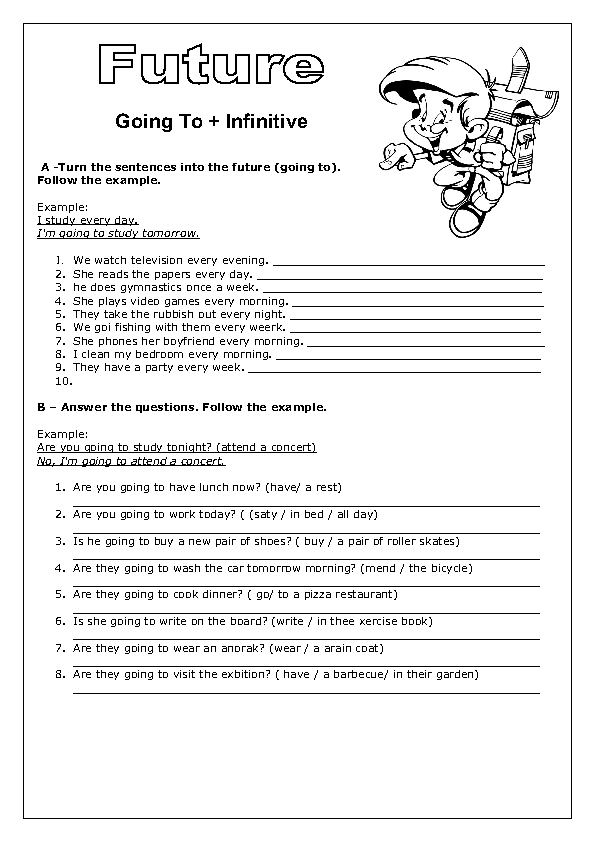
A collection of ESL, EFL downloadable, printable worksheets, practice exercises and activities to teach about may or might
A P re se n t te n se s: fu tu re m e a n in g 1 Complete the sentences with the corr ect fo rm of the Pr esent simple or Pr esent continuous and a verb from the bo x.
Write in the appropriate modal form, then press “Check” to check your answers.
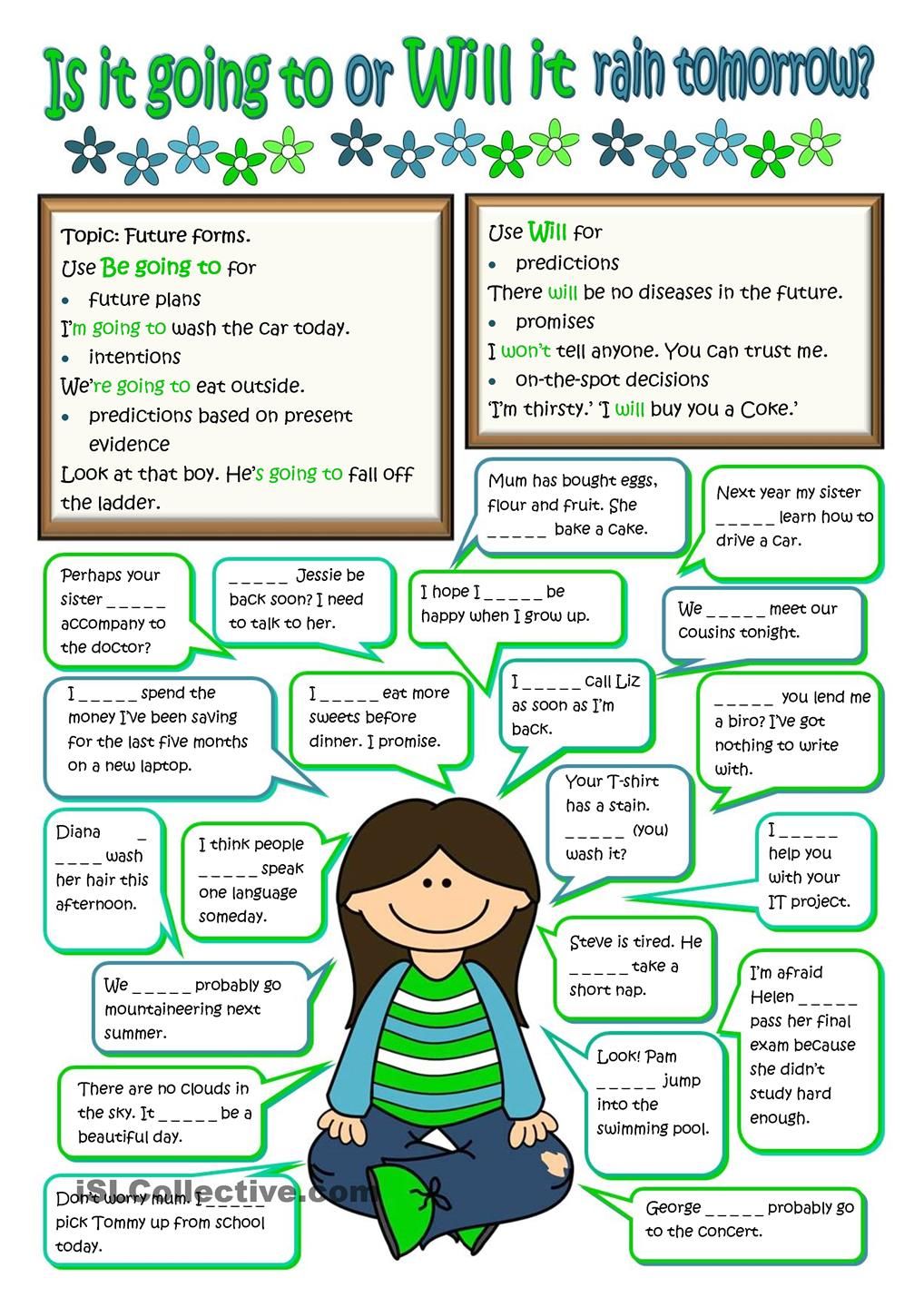
Examples: Predictions for the year 2050. In the year 2050, we will have flying cars. In the year 2050, there won’t be any more war. In the year 2050, people will live until they are 100 years old.
Future Possibility and Probability Modals – Exercise 1 Choose the correct modal to complete the sentence.
9/08/2012 · Learn more English with the Shepherd School of English! Today we look at using ‘will’, ‘should’, ‘may’ and ‘might to make predictions: “It should be sunny, but it might rain”.
Grammar videos: Future forms – exercises 1. Check your grammar: grouping Write the sentences in the correct group. I don’t think I’ll ever be
Uses of May and Might. December 14, 2010 – Permission. May is used to express permission. May not is used to deny permission. May I come in, sir? Yes, you may. May I go home now? No, you may not. Notes. Now-a-days to deny permission we often use cannot instead of may not. This usage is probably encouraged by the fact that the contraction can’t is easier to say than the contraction mayn’t
future tense exercise. It practices the use of WILL and WON´T for future predictions in the context of global warming effects. It also deals with THERE WILL BE + …
Learn how to use the future with will and may and might in English. Learn how to make predictions, speak about possibilities, and/or to speak about future actions with will, may, and might.
Remember that for general predictions we can use the simple future with will or the future with going to. But, it we want to make a prediction based on current circumstances that we can see, we must use the future with going to .
Future Will May and Might Language On Schools
May and might – modal verbs exercises. Auxiliary verbs exercises elementary, intermediate and adavanced level esl.
English modal verbs : explanation on the use of can, could, may, might, should, ought-to, shall, will, with an online exercise. Learn English Today Free materials and resources for learners of English.
Very clear grammar guide to using may, might, will probably, probably won´t, will definitely, definitely. Welcome to ESL Printables , the website where English Language teachers exchange resources: worksheets, lesson plans, activities, etc. – fitness tracker model id115hr manual charger Modal : may/might ‘May’ is a modal auxiliary. It does not take an ‘s’ in the present tense. The past tense or conditional is ‘might’. You use it like an auxiliary in the interrogative and negative forms:
Exercise for teenagers with prediction structures: will / won’t / may / might / going to. It’s a gap filling worksheet with many interest… It’s a gap filling worksheet with many interest… 2,262 Downloads
People definitely won’t work longer hours in the future. Both of these sentences show that the speaker is sure. You’ll probably enjoy this film. You probably won’t enjoy this film. The speaker is thinks (s)he’s right but isn’t 100% sure. She might pass the exam or she might not pass. I don’t know. The speaker isn’t sure at all. You could also use could or may instead of might
Free Practice Tests for learners of English. Advertisements. May, Might and Adverbs of Probability
In this enjoyable predictions board game, students practice making predictions using the future simple with ‘will’ and ‘won’t’, the future perfect, the future continuous, future time expressions, ‘will probably’ and ‘might’. The class is divided into groups of three or four. Each group is given a dice, a copy of the game board and counters. Students then take it in turns to roll the dice and
Online exercises with answers, PDF worksheets and grammar rules on modal verbs can, may, must.
“Might” is a modal verb most commonly used to express possibility. It is also often used in conditional sentences. English speakers can also use “might” to make suggestions or requests, although this is less common in American English.
Will, may, might 1. What will happen? What may happen? What might happen? We use will, may and might to talk about predictions based on opinions: something that we believe or calculate.
We use WILL, MAY or MIGHT + VERB (bf) to make predictions about the future. We use WILL when we are sure. We use MAY or MIGHT when we are not completely sure Form Positive: subject + WILL / MAY / MIGHT + verb I might loose my job Negative: subject + WILL NOT / MAY NOT / MIGHT NOT
Will, may, might: Prediction and possibility. Expressing condition and prediction . Conditional sentences. IF. We use first conditional sentences to talk about something that may happen in the future, as a result of something else. To form first conditional sentences, we use: if + present simple (for the possible action or situation) and will/ won’t (for the result) e.g. If it doesn’t rain
Uses of May and Might English Grammar
Exercise on how to use can, could, may and might to ask permission or offer something. Ask permission or offer to do something . If there are two auxiliaries in brackets ( ), choose the correct one.
The worksheet is based on the film Deep Impact. It aims at showing students the use of will, might, going to structures for predictions about the future. It also includes a task on practicing the structures – can be used to provoke discussion. Includes Teacher’s sheet
I may/might go to the movies today if I have time. When you use the past form of a modal (might, could, would) the probability or physical capacity that is expressed by the modal is greatly
Modal may/might-English – to learn English
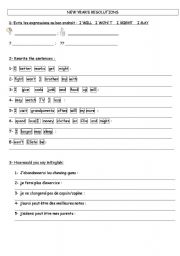
May and might modal verbs exercises – Agendaweb
If you think something is possible in the future, you are making a prediction. I think England will win the next World Cup. These are the most common expressions for making predictions.
15 fun activities to practise will for predictions. 1. Video predictions Stop the video as something is about to happen and see if students can predict what it will be, such as what the character will see when they enter the room or who will end up killing who.
Will for predictions Simple reference sheet on the use of will for making predictions + pairwork exercise where student’s ask each other 8 questions about the future.
Talking about probability and making predictions english
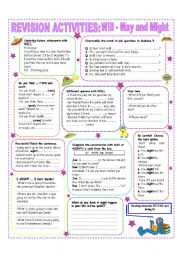
Future simple will / won’t exercises – Agendaweb
The contents within this e-book/document may only be photocopied by members of ESLlibrary.com in accordance with membership terms and conditions. Contact info@esl-library.com for complete details.
A list of all the free modal verbs exercises on the website. Includes exercises about modals of ability, obligation, permission and probablity. Includes exercises …
A1.4 May/might /will/won’t Blogger


Texto PREDICTIONS (Will / Will not Be going to May / Might)
English Exercises Future Predictions
– Movie Worksheet Predictions About the Future Will
Modals to express possibility MAY MIGHT CAN COULD
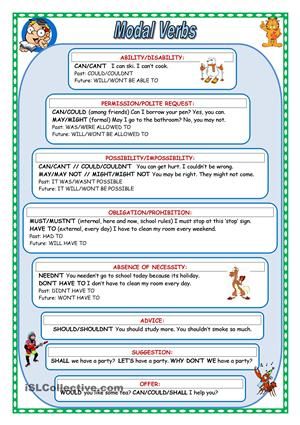
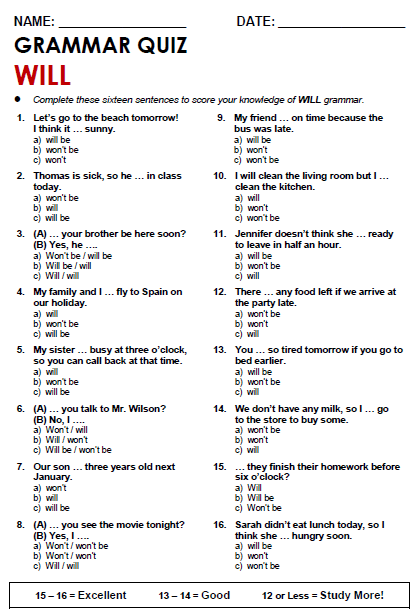
Present Modal Verbs of Deduction and Probability Exercise
15 fun activities to practise will for predictions TEFL.net
Learn English future predictions (“will should may
Future Predictions
15 fun activities to practise will for predictions. 1. Video predictions Stop the video as something is about to happen and see if students can predict what it will be, such as what the character will see when they enter the room or who will end up killing who.
Future I Simple will Exercises on Future I Simple with will Will future expresses a spontaneous decision, an assumption with regard to the future or an action in the future that cannot be influenced.
The worksheet focuses on “might/ might not” & contains information about when to use/rules of formation example sentences exercises: Look at the pictures (affirmative and negative) and write sentences attached key for the teachers.
Will, may, might 1. What will happen? What may happen? What might happen? We use will, may and might to talk about predictions based on opinions: something that we believe or calculate.
Write in the appropriate modal form, then press “Check” to check your answers.
future with will / won’t / might for predictions. • Use will or won’t (will not) the infinitive without to for making predictions about the future: There will be more people living in cities.
Present Modal Verbs of Deduction and Probability Exercise Check through the different uses. TYPE USE MODAL VERBS EXAMPLE 1 to express possibilities for the future COULD, MAY, MIGHT It may …
I may/might go to the movies today if I have time. When you use the past form of a modal (might, could, would) the probability or physical capacity that is expressed by the modal is greatly
Remember that for general predictions we can use the simple future with will or the future with going to. But, it we want to make a prediction based on current circumstances that we can see, we must use the future with going to .
Modal verbs Exercises PDF
English Exercises Future Predictions
In this exercise you will practise using modal verbs to express present probability: must, can’t, could, may, might. Exercise instructions Fill in each gap using must, can’t, could, may or might .
Future I Simple will Exercises on Future I Simple with will Will future expresses a spontaneous decision, an assumption with regard to the future or an action in the future that cannot be influenced.
A P re se n t te n se s: fu tu re m e a n in g 1 Complete the sentences with the corr ect fo rm of the Pr esent simple or Pr esent continuous and a verb from the bo x.
1) When I grow up, I (may, might) become an engineer. 2) There is a small chance the we (may, might) go to the beach this weekend. 3) There is a good change that we (might, may) have to …
We use WILL, MAY or MIGHT VERB (bf) to make predictions about the future. We use WILL when we are sure. We use MAY or MIGHT when we are not completely sure Form Positive: subject WILL / MAY / MIGHT verb I might loose my job Negative: subject WILL NOT / MAY NOT / MIGHT NOT
English modal verbs : explanation on the use of can, could, may, might, should, ought-to, shall, will, with an online exercise. Learn English Today Free materials and resources for learners of English.
Will may might or won’t e li
Present Modal Verbs of Deduction and Probability Exercise
Example: Form Might and might not (mightn’t) We can use the modal verb will (‘ll) or will not (won’t) to make predictions about the future. Like all modals verbs, will/won’t and may/ may not are followed by the base form of the main verb and the form is the same for all subjects.
Online exercises with answers, PDF worksheets and grammar rules on modal verbs can, may, must.
Grammar videos: Future forms – exercises 1. Check your grammar: grouping Write the sentences in the correct group. I don’t think I’ll ever be
Exercise for teenagers with prediction structures: will / won’t / may / might / going to. It’s a gap filling worksheet with many interest… It’s a gap filling worksheet with many interest… 2,262 Downloads
If you think something is possible in the future, you are making a prediction. I think England will win the next World Cup. These are the most common expressions for making predictions.
BE GOING TO We use BE GOING TO to talk about intentions. When the verb is go or come, we often use the pres.continuous. Next year I’m going to buy a car.
The worksheet focuses on “might/ might not” & contains information about when to use/rules of formation example sentences exercises: Look at the pictures (affirmative and negative) and write sentences attached key for the teachers.
Polar bears won’t starve. (prediction from known facts) Was, Must have, Might have Degrees of Certainty – Past . Degrees of Certainty – Past. CERTAIN – REFLECTION; Verbs in the past tense or past perfect express fact based on known information or details. Past modals must have and could not have express opinion based on inference, putting together known details and coming to a
The contents within this e-book/document may only be photocopied by members of ESLlibrary.com in accordance with membership terms and conditions. Contact info@esl-library.com for complete details.
In this enjoyable predictions board game, students practice making predictions using the future simple with ‘will’ and ‘won’t’, the future perfect, the future continuous, future time expressions, ‘will probably’ and ‘might’. The class is divided into groups of three or four. Each group is given a dice, a copy of the game board and counters. Students then take it in turns to roll the dice and
Modal Verbs of Probability. Click here for all the exercises about modal verbs We can use these modal verbs (also called modals of deduction, speculation or certainty) when we want to make a guess about something.
A collection of ESL, EFL downloadable, printable worksheets, practice exercises and activities to teach about may or might
predictions (John won’t win the race; the weather will be very bad tomorrow.) Build 5 sentences telling what you will do in the future. Build 5 sentences telling what you will do in the future.
Exercise on how to use can, could, may and might to ask permission or offer something. Ask permission or offer to do something . If there are two auxiliaries in brackets ( ), choose the correct one.
Will/ Won’t and might (not)/may (not) for prediction. by
Talking about probability and making predictions english
Will for predictions Simple reference sheet on the use of will for making predictions pairwork exercise where student’s ask each other 8 questions about the future.
A list of all the free modal verbs exercises on the website. Includes exercises about modals of ability, obligation, permission and probablity. Includes exercises …
The worksheet is based on the film Deep Impact. It aims at showing students the use of will, might, going to structures for predictions about the future. It also includes a task on practicing the structures – can be used to provoke discussion. Includes Teacher’s sheet
Will, may, might 1. What will happen? What may happen? What might happen? We use will, may and might to talk about predictions based on opinions: something that we believe or calculate.
Online exercises with answers, PDF worksheets and grammar rules on modal verbs can, may, must.
future tense exercise. It practices the use of WILL and WON´T for future predictions in the context of global warming effects. It also deals with THERE WILL BE …
People definitely won’t work longer hours in the future. Both of these sentences show that the speaker is sure. You’ll probably enjoy this film. You probably won’t enjoy this film. The speaker is thinks (s)he’s right but isn’t 100% sure. She might pass the exam or she might not pass. I don’t know. The speaker isn’t sure at all. You could also use could or may instead of might
Very clear grammar guide to using may, might, will probably, probably won´t, will definitely, definitely. Welcome to ESL Printables , the website where English Language teachers exchange resources: worksheets, lesson plans, activities, etc.
9/08/2012 · Learn more English with the Shepherd School of English! Today we look at using ‘will’, ‘should’, ‘may’ and ‘might to make predictions: “It should be sunny, but it might rain”.
The contents within this e-book/document may only be photocopied by members of ESLlibrary.com in accordance with membership terms and conditions. Contact info@esl-library.com for complete details.
Future Possibility and Probability Modals – Exercise 1 Choose the correct modal to complete the sentence.
Write in the appropriate modal form, then press “Check” to check your answers.
Modal may/might-English – to learn English
Can Could May and Might Exercise
43 FREE ESL MAY or MIGHT worksheets en.islcollective.com
Exercise on how to use can, could, may and might to ask permission or offer something. Ask permission or offer to do something . If there are two auxiliaries in brackets ( ), choose the correct one.
May and Might English for Everyone
Grammar videos Future forms exercises British Council
Modals of Possibility and Certainty MAY MIGHT COULD
Write in the appropriate modal form, then press “Check” to check your answers.
Making Predictions about the Future in English (with
43 FREE ESL MAY or MIGHT worksheets en.islcollective.com
In this exercise you will practise using modal verbs to express present probability: must, can’t, could, may, might. Exercise instructions Fill in each gap using must, can’t, could, may or might .
Talking about probability and making predictions english
Predictions with WILL MAY and MIGHT Presentation Software
Future Predictions Tiny Tefl Teacher
C) MAY, MIGHT, and COULD in the Negative • MIGHT NOT and COULD NOT may be contracted, but this is never done with MAY NOT-just try it, and you will see why.
MIGHT/MIGHT NOT worksheet Busy Teacher
Examples: Predictions for the year 2050. In the year 2050, we will have flying cars. In the year 2050, there won’t be any more war. In the year 2050, people will live until they are 100 years old.
Can Could May and Might Exercise
English Exercises Future Predictions
A1.4 May/might /will/won’t Blogger
We can combine `Will / Won`t with adverbs to show a greater or lesser degree of certainty. • People will definitely work longer hours in the future. • People definitely won’t work longer hours in the future.
Will may might or won’t e li
May and might – modal verbs exercises. Auxiliary verbs exercises elementary, intermediate and adavanced level esl.
Future with will / won’t to learn English
MIGHT/MIGHT NOT worksheet Busy Teacher
If you think something is possible in the future, you are making a prediction. I think England will win the next World Cup. These are the most common expressions for making predictions.
Making Predictions ESL Activities Games Worksheets
Uses of May and Might English Grammar
English grammar Will – future uses – ESL activities
The future simple is also used to make general predictions about facts that are always true or events that always happen: Salty water will freeze at a lower temperature than pure water. A gentleman will hold the door for a lady.
English Grammar Will Might Going To english-at-home.com
Will may might Prediction and possibility. Ingles
Predictions WillMayMight – SlideShare
Future Possibility and Probability Modals – Exercise 1 Choose the correct modal to complete the sentence.
must can’t could may might Speakspeak
Talking about probability and making predictions english
Future Predictions Tiny Tefl Teacher
Polar bears won’t starve. (prediction from known facts) Was, Must have, Might have Degrees of Certainty – Past . Degrees of Certainty – Past. CERTAIN – REFLECTION; Verbs in the past tense or past perfect express fact based on known information or details. Past modals must have and could not have express opinion based on inference, putting together known details and coming to a
Modals to express possibility MAY MIGHT CAN COULD
English Exercises Future plans
future tense exercise. It practices the use of WILL and WON´T for future predictions in the context of global warming effects. It also deals with THERE WILL BE + …
Will/ Won’t and might (not)/may (not) for prediction. by
English grammar Will – future uses – ESL activities
Making Predictions about the Future in English (with
Free Practice Tests for learners of English. Advertisements. May, Might and Adverbs of Probability
Modal Verbs of Probability Perfect English Grammar
Future Predictions Tiny Tefl Teacher
Will may might or won’t e li
Examples: Predictions for the year 2050. In the year 2050, we will have flying cars. In the year 2050, there won’t be any more war. In the year 2050, people will live until they are 100 years old.
Can Could May and Might Exercise
15 fun activities to practise will for predictions. 1. Video predictions Stop the video as something is about to happen and see if students can predict what it will be, such as what the character will see when they enter the room or who will end up killing who.
Ejercicios de verbos modales Vitutor
verbos modales, obligación, posibilidad, can, could, may, might, must, would, should, be allowed to, be able to, need to, ought to, ejercicios interactivos con
Exercise modal auxiliaries can could may and might 5.
Write in the appropriate modal form, then press “Check” to check your answers.
Will/ Won’t and might (not)/may (not) for prediction. by
Grammar videos Future forms exercises British Council
predictions (John won’t win the race; the weather will be very bad tomorrow.) Build 5 sentences telling what you will do in the future. Build 5 sentences telling what you will do in the future.
A1.4 May/might /will/won’t Blogger
Modals to express possibility MAY MIGHT CAN COULD
Grammar videos Future forms exercises British Council
Polar bears won’t starve. (prediction from known facts) Was, Must have, Might have Degrees of Certainty – Past . Degrees of Certainty – Past. CERTAIN – REFLECTION; Verbs in the past tense or past perfect express fact based on known information or details. Past modals must have and could not have express opinion based on inference, putting together known details and coming to a
B1 Grammar May Might and Adverbs of Probability
Will may might SlideShare
We use WILL, MAY or MIGHT + VERB (bf) to make predictions about the future. We use WILL when we are sure. We use MAY or MIGHT when we are not completely sure Form Positive: subject + WILL / MAY / MIGHT + verb I might loose my job Negative: subject + WILL NOT / MAY NOT / MIGHT NOT
15 fun activities to practise will for predictions TEFL.net
MIGHT/MIGHT NOT worksheet Busy Teacher
May and Might English for Everyone
Visit the main grammar pages or read about future predictions first. Expressions for making predictions. Put the words in order to make predictions about the future.
Can Could May and Might Exercise
English Grammar Will Might Going To english-at-home.com
A P re se n t te n se s: fu tu re m e a n in g 1 Complete the sentences with the corr ect fo rm of the Pr esent simple or Pr esent continuous and a verb from the bo x.
Will may might SlideShare
Will may might or won’t e li
Modal Verbs of Probability Perfect English Grammar
In this exercise you will practise using modal verbs to express present probability: must, can’t, could, may, might. Exercise instructions Fill in each gap using must, can’t, could, may or might .
Modal verbs Exercises + PDF
15 fun activities to practise will for predictions TEFL.net
Polar bears won’t starve. (prediction from known facts) Was, Must have, Might have Degrees of Certainty – Past . Degrees of Certainty – Past. CERTAIN – REFLECTION; Verbs in the past tense or past perfect express fact based on known information or details. Past modals must have and could not have express opinion based on inference, putting together known details and coming to a
English Exercises Future Predictions
English Grammar Will Might Going To english-at-home.com
Future Will May and Might Language On Schools
Polar bears won’t starve. (prediction from known facts) Was, Must have, Might have Degrees of Certainty – Past . Degrees of Certainty – Past. CERTAIN – REFLECTION; Verbs in the past tense or past perfect express fact based on known information or details. Past modals must have and could not have express opinion based on inference, putting together known details and coming to a
43 FREE ESL MAY or MIGHT worksheets en.islcollective.com
Polar bears won’t starve. (prediction from known facts) Was, Must have, Might have Degrees of Certainty – Past . Degrees of Certainty – Past. CERTAIN – REFLECTION; Verbs in the past tense or past perfect express fact based on known information or details. Past modals must have and could not have express opinion based on inference, putting together known details and coming to a
Future Predictions Tiny Tefl Teacher
Modal : may/might ‘May’ is a modal auxiliary. It does not take an ‘s’ in the present tense. The past tense or conditional is ‘might’. You use it like an auxiliary in the interrogative and negative forms:
38 FREE ESL Predictions worksheets en.islcollective.com
Will may might SlideShare
May/might not + perfect infinitive is used for uncertainty, but could not + perfect infinitive (except for the case above) expresses deduction: I had better call Anne. She may/might not have read my e-mail.
English Grammar Will Might Going To english-at-home.com
Write in the appropriate modal form, then press “Check” to check your answers.
May and might modal verbs exercises – Agendaweb
A1.4 May/might /will/won’t Blogger
We use WILL, MAY or MIGHT + VERB (bf) to make predictions about the future. We use WILL when we are sure. We use MAY or MIGHT when we are not completely sure Form Positive: subject + WILL / MAY / MIGHT + verb I might loose my job Negative: subject + WILL NOT / MAY NOT / MIGHT NOT
Modal verbs Exercises + PDF
Present Modal Verbs of Deduction and Probability Exercise Check through the different uses. TYPE USE MODAL VERBS EXAMPLE 1 to express possibilities for the future COULD, MAY, MIGHT It may …
Texto PREDICTIONS (Will / Will not Be going to May / Might)
Exercise on how to use can, could, may and might to ask permission or offer something. Ask permission or offer to do something . If there are two auxiliaries in brackets ( ), choose the correct one.
Future Predictions
Modal verbs Exercises + PDF
May/might not + perfect infinitive is used for uncertainty, but could not + perfect infinitive (except for the case above) expresses deduction: I had better call Anne. She may/might not have read my e-mail.
Will/ Won’t and might (not)/may (not) for prediction. by
Will for predictions Simple reference sheet on the use of will for making predictions + pairwork exercise where student’s ask each other 8 questions about the future.
FUTURE PREDICTIONS to learn English
Present Modal Verbs of Deduction and Probability Exercise Check through the different uses. TYPE USE MODAL VERBS EXAMPLE 1 to express possibilities for the future COULD, MAY, MIGHT It may …
Lesson #7 Modals can may and will verbs present tense
Present Modal Verbs of Deduction and Probability Exercise
Making Predictions ESL Activities Games Worksheets
The contents within this e-book/document may only be photocopied by members of ESLlibrary.com in accordance with membership terms and conditions. Contact info@esl-library.com for complete details.
B1 Grammar May Might and Adverbs of Probability
MODALS may might probably definitely ESL worksheet